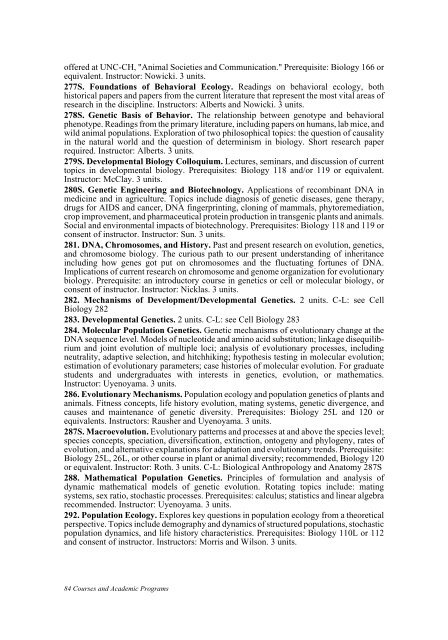2005-06 - Office of the Registrar - Duke University
2005-06 - Office of the Registrar - Duke University
2005-06 - Office of the Registrar - Duke University
Create successful ePaper yourself
Turn your PDF publications into a flip-book with our unique Google optimized e-Paper software.
<strong>of</strong>fered at UNC-CH, "Animal Societies and Communication." Prerequisite: Biology 166 or<br />
equivalent. Instructor: Nowicki. 3 units.<br />
277S. Foundations <strong>of</strong> Behavioral Ecology. Readings on behavioral ecology, both<br />
historical papers and papers from <strong>the</strong> current literature that represent <strong>the</strong> most vital areas <strong>of</strong><br />
research in <strong>the</strong> discipline. Instructors: Alberts and Nowicki. 3 units.<br />
278S. Genetic Basis <strong>of</strong> Behavior. The relationship between genotype and behavioral<br />
phenotype. Readings from <strong>the</strong> primary literature, including papers on humans, lab mice, and<br />
wild animal populations. Exploration <strong>of</strong> two philosophical topics: <strong>the</strong> question <strong>of</strong> causality<br />
in <strong>the</strong> natural world and <strong>the</strong> question <strong>of</strong> determinism in biology. Short research paper<br />
required. Instructor: Alberts. 3 units.<br />
279S. Developmental Biology Colloquium. Lectures, seminars, and discussion <strong>of</strong> current<br />
topics in developmental biology. Prerequisites: Biology 118 and/or 119 or equivalent.<br />
Instructor: McClay. 3 units.<br />
280S. Genetic Engineering and Biotechnology. Applications <strong>of</strong> recombinant DNA in<br />
medicine and in agriculture. Topics include diagnosis <strong>of</strong> genetic diseases, gene <strong>the</strong>rapy,<br />
drugs for AIDS and cancer, DNA fingerprinting, cloning <strong>of</strong> mammals, phytoremediation,<br />
crop improvement, and pharmaceutical protein production in transgenic plants and animals.<br />
Social and environmental impacts <strong>of</strong> biotechnology. Prerequisites: Biology 118 and 119 or<br />
consent <strong>of</strong> instructor. Instructor: Sun. 3 units.<br />
281. DNA, Chromosomes, and History. Past and present research on evolution, genetics,<br />
and chromosome biology. The curious path to our present understanding <strong>of</strong> inheritance<br />
including how genes got put on chromosomes and <strong>the</strong> fluctuating fortunes <strong>of</strong> DNA.<br />
Implications <strong>of</strong> current research on chromosome and genome organization for evolutionary<br />
biology. Prerequisite: an introductory course in genetics or cell or molecular biology, or<br />
consent <strong>of</strong> instructor. Instructor: Nicklas. 3 units.<br />
282. Mechanisms <strong>of</strong> Development/Developmental Genetics. 2 units. C-L: see Cell<br />
Biology 282<br />
283. Developmental Genetics. 2 units. C-L: see Cell Biology 283<br />
284. Molecular Population Genetics. Genetic mechanisms <strong>of</strong> evolutionary change at <strong>the</strong><br />
DNA sequence level. Models <strong>of</strong> nucleotide and amino acid substitution; linkage disequilibrium<br />
and joint evolution <strong>of</strong> multiple loci; analysis <strong>of</strong> evolutionary processes, including<br />
neutrality, adaptive selection, and hitchhiking; hypo<strong>the</strong>sis testing in molecular evolution;<br />
estimation <strong>of</strong> evolutionary parameters; case histories <strong>of</strong> molecular evolution. For graduate<br />
students and undergraduates with interests in genetics, evolution, or ma<strong>the</strong>matics.<br />
Instructor: Uyenoyama. 3 units.<br />
286. Evolutionary Mechanisms. Population ecology and population genetics <strong>of</strong> plants and<br />
animals. Fitness concepts, life history evolution, mating systems, genetic divergence, and<br />
causes and maintenance <strong>of</strong> genetic diversity. Prerequisites: Biology 25L and 120 or<br />
equivalents. Instructors: Rausher and Uyenoyama. 3 units.<br />
287S. Macroevolution. Evolutionary patterns and processes at and above <strong>the</strong> species level;<br />
species concepts, speciation, diversification, extinction, ontogeny and phylogeny, rates <strong>of</strong><br />
evolution, and alternative explanations for adaptation and evolutionary trends. Prerequisite:<br />
Biology 25L, 26L, or o<strong>the</strong>r course in plant or animal diversity; recommended, Biology 120<br />
or equivalent. Instructor: Roth. 3 units. C-L: Biological Anthropology and Anatomy 287S<br />
288. Ma<strong>the</strong>matical Population Genetics. Principles <strong>of</strong> formulation and analysis <strong>of</strong><br />
dynamic ma<strong>the</strong>matical models <strong>of</strong> genetic evolution. Rotating topics include: mating<br />
systems, sex ratio, stochastic processes. Prerequisites: calculus; statistics and linear algebra<br />
recommended. Instructor: Uyenoyama. 3 units.<br />
292. Population Ecology. Explores key questions in population ecology from a <strong>the</strong>oretical<br />
perspective. Topics include demography and dynamics <strong>of</strong> structured populations, stochastic<br />
population dynamics, and life history characteristics. Prerequisites: Biology 110L or 112<br />
and consent <strong>of</strong> instructor. Instructors: Morris and Wilson. 3 units.<br />
84 Courses and Academic Programs









